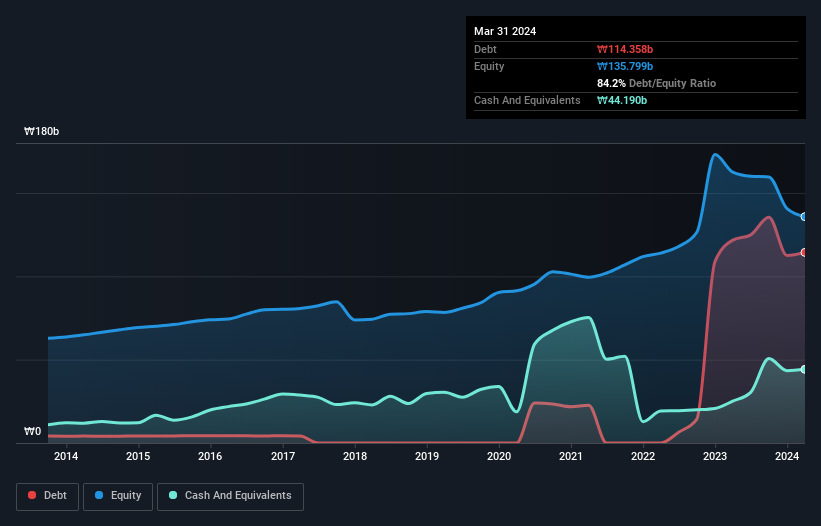- South Korea
- /
- Semiconductors
- /
- KOSDAQ:A102120
ABOV Semiconductor (KOSDAQ:102120) Is Making Moderate Use Of Debt
Warren Buffett famously said, 'Volatility is far from synonymous with risk.' So it might be obvious that you need to consider debt, when you think about how risky any given stock is, because too much debt can sink a company. We note that ABOV Semiconductor Co., Ltd. (KOSDAQ:102120) does have debt on its balance sheet. But the more important question is: how much risk is that debt creating?
When Is Debt A Problem?
Debt is a tool to help businesses grow, but if a business is incapable of paying off its lenders, then it exists at their mercy. Ultimately, if the company can't fulfill its legal obligations to repay debt, shareholders could walk away with nothing. However, a more common (but still painful) scenario is that it has to raise new equity capital at a low price, thus permanently diluting shareholders. By replacing dilution, though, debt can be an extremely good tool for businesses that need capital to invest in growth at high rates of return. The first step when considering a company's debt levels is to consider its cash and debt together.
Check out our latest analysis for ABOV Semiconductor
What Is ABOV Semiconductor's Debt?
The image below, which you can click on for greater detail, shows that ABOV Semiconductor had debt of ₩114.4b at the end of March 2024, a reduction from ₩121.7b over a year. However, it does have ₩44.2b in cash offsetting this, leading to net debt of about ₩70.2b.

A Look At ABOV Semiconductor's Liabilities
According to the last reported balance sheet, ABOV Semiconductor had liabilities of ₩114.6b due within 12 months, and liabilities of ₩42.0b due beyond 12 months. On the other hand, it had cash of ₩44.2b and ₩27.7b worth of receivables due within a year. So it has liabilities totalling ₩84.8b more than its cash and near-term receivables, combined.
This deficit isn't so bad because ABOV Semiconductor is worth ₩191.4b, and thus could probably raise enough capital to shore up its balance sheet, if the need arose. However, it is still worthwhile taking a close look at its ability to pay off debt. When analysing debt levels, the balance sheet is the obvious place to start. But you can't view debt in total isolation; since ABOV Semiconductor will need earnings to service that debt. So when considering debt, it's definitely worth looking at the earnings trend. Click here for an interactive snapshot.
In the last year ABOV Semiconductor had a loss before interest and tax, and actually shrunk its revenue by 6.1%, to ₩233b. We would much prefer see growth.
Caveat Emptor
Importantly, ABOV Semiconductor had an earnings before interest and tax (EBIT) loss over the last year. To be specific the EBIT loss came in at ₩12b. When we look at that and recall the liabilities on its balance sheet, relative to cash, it seems unwise to us for the company to have any debt. Quite frankly we think the balance sheet is far from match-fit, although it could be improved with time. We would feel better if it turned its trailing twelve month loss of ₩28b into a profit. So in short it's a really risky stock. The balance sheet is clearly the area to focus on when you are analysing debt. However, not all investment risk resides within the balance sheet - far from it. Case in point: We've spotted 3 warning signs for ABOV Semiconductor you should be aware of, and 1 of them is a bit concerning.
When all is said and done, sometimes its easier to focus on companies that don't even need debt. Readers can access a list of growth stocks with zero net debt 100% free, right now.
New: Manage All Your Stock Portfolios in One Place
We've created the ultimate portfolio companion for stock investors, and it's free.
• Connect an unlimited number of Portfolios and see your total in one currency
• Be alerted to new Warning Signs or Risks via email or mobile
• Track the Fair Value of your stocks
Have feedback on this article? Concerned about the content? Get in touch with us directly. Alternatively, email editorial-team (at) simplywallst.com.
This article by Simply Wall St is general in nature. We provide commentary based on historical data and analyst forecasts only using an unbiased methodology and our articles are not intended to be financial advice. It does not constitute a recommendation to buy or sell any stock, and does not take account of your objectives, or your financial situation. We aim to bring you long-term focused analysis driven by fundamental data. Note that our analysis may not factor in the latest price-sensitive company announcements or qualitative material. Simply Wall St has no position in any stocks mentioned.
Have feedback on this article? Concerned about the content? Get in touch with us directly. Alternatively, email editorial-team@simplywallst.com
About KOSDAQ:A102120
ABOV Semiconductor
Designs, manufactures, and sells microcontrollers, and memory and semiconductor solutions in South Korea and internationally.
Adequate balance sheet second-rate dividend payer.
Market Insights
Community Narratives


Recently Updated Narratives


MINISO's fair value is projected at 26.69 with an anticipated PE ratio shift of 20x


The Quiet Giant That Became AI’s Power Grid


Nova Ljubljanska Banka d.d will expect a 11.2% revenue boost driving future growth
Popular Narratives


The company that turned a verb into a global necessity and basically runs the modern internet, digital ads, smartphones, maps, and AI.


MicroVision will explode future revenue by 380.37% with a vision towards success



